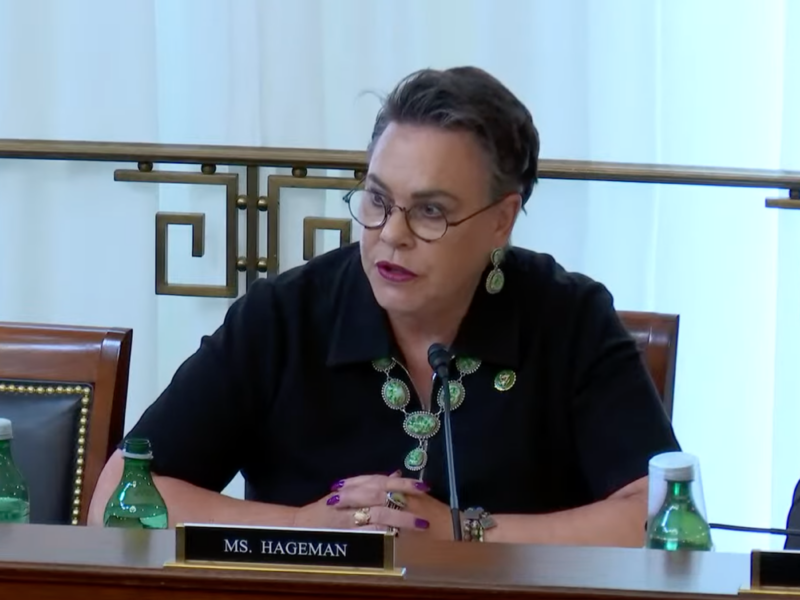Hageman, Republicans Propose Overhaul to ‘Destructive’ Endangered Species Act
Wyoming congresswoman continues push to remove grizzly bears from the endangered list
- Published In: Politics
- Last Updated: Jul 20, 2023

Rep. Harriet Hageman (R-Wyo.) participated in a hearing on Tuesday exploring the "destructive" impacts of the Endangered Species Act ahead of its 50th anniversary. (Photo via YouTube / House Natural Resources Committee)
By Jacob Gardenswartz
Special to the Wyoming Truth
WASHINGTON — Ahead of its 50th anniversary, Republicans in the House of Representatives on Tuesday highlighted what they allege are the “destructive costs” of the Endangered Species Act (ESA), as they’re proposing a litany of changes to weaken protections for wildlife species and bolster the rights of individuals and businesses.
Among the chief antagonists of the landmark environmental legislation is Rep. Harriet Hageman (R-Wyo.). Through her position on the House Natural Resources Committee, Hageman has repeatedly advocated for removing protections for certain species — particularly the Greater Yellowstone Ecosystem population of grizzly bears.
During the panel’s Subcommittee on Water, Wildlife and Fisheries hearing, Hageman again touted her measures to eliminate protections for those species, claiming their population has fully recovered and pointing to potential problems the bears are causing to rural communities.
“People now deal directly with grizzly bears that have wandered into rural and agricultural areas,” Hageman claimed. “These same people were once promised that the bears would not be allowed to permanently occupy the lands where they work, live and recreate on a daily basis. And unless we choose to act, this promise will remain broken, and these populations will continue to expand completely unmanaged.”
Other Republicans participating in the hearing were less directly hostile to the law, instead claiming its financial impacts on Americans outweigh the benefits it provides to threatened wildlife.
“The ESA was a well-intentioned law,” subcommittee chairman Rep. Cliff Bentz (R-Ore.) noted in his opening remarks. “But after 50 years of the ESA and untold billions of expenditures paid many times by small communities and families and not the nation, and with questionable benefits, it’s definitely time to come up with a better plan.”
Beyond taking issue with individual species remaining on the endangered list, Bentz and several witnesses who testified during the hearing claimed ESA rules often prioritize certain species over others — to the detriment of local businesses.
Sean Vibbert, owner of a seed company in central Oregon, pointed to a recent situation whereby a significant portion of the community’s limited water was run from a local reservoir down the Deschutes River to aid the spotted frog, a so-called “indicator species” placed on the endangered list in 2014.
That meant companies like Vibbert’s had less access to the water they needed for their own crops and livestock. “We don’t even know if the mitigation efforts in my area for the spotted frog are effective or even work,” he testified. “It is sad, but no one species should take precedence over the community, its citizens or other species.”
Witnesses also pointed to the high costs required to develop lands impacting endangered species. In addition to the various studies required to gain approval, such developments almost always face lawsuits from environmental groups.
To remedy these matters, Republicans announced the creation of a new “working group” to “engage” with local stakeholders impacted by the ESA and develop amendments to the Act to “modernize and renew the essay for the 21st century.” Rep. Dan Newhouse (R-Wash.) will chair the group, working alongside stakeholders in the Congressional Western Caucus and Natural Resources Committee — Hageman among them.
But though they urged Democrats on the panel to join them in such efforts, few seemed interested, and some suggested the problem with the ESA was not too many species listed but too few.
“We should be talking about listing, not delisting, because the fact is political opposition to listing and the lack of agency resources for listing means that species are often listed too late in the game,” said Rep. Jared Huffman (D-Calif.), the top Democrat on the subcommittee.
“It’s almost hard to believe that 50 years ago, this landmark legislation was spearheaded by Republican environmental champions,” Huffman added. “Today, Republican environmentalists are the most critically endangered species in politics.”













